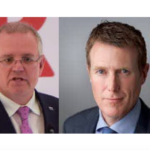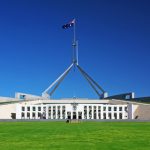Christian Porter: A National Security Risk Waiting to Happen

Revelations regarding then social services minister Christian Porter’s compromising behaviour with a young female staffer in a Canberra bar in 2017 aired on the ABC last week.
Occurring while his wife and child were back home in Perth, the report has led to suggestions that the now attorney general could pose a national security risk.
The ABC further outlined that this was no one-off occasion, as the nation’s chief lawmaker has a history of misogynistic behaviour going back decades, which has included making unwanted advances towards women whilst in federal office.
Malcolm Turnbull told Four Corners that he’d reprimanded Porter following the highly-visible incident with the staffer. And after viewing the ABC report, the former PM admitted that he may not have appointed Porter AG had he known the full extent of what had occurred that night.
But whilst the tales of a philandering minister have tarnished the reputation of one of the nation’s most senior political positions, one only has to scratch the surface to reveal that the former WA Crown prosecutor has a history of questionable behaviour in office.
Suspect and in plain sight
In early 2018, the Australian National Audit Office had put together a report on the Defence Department’s $2 billion contract with Thales Australia, which related to the purchase of Hawkei vehicles for the army.
The ANAO flagged the report with Thales prior to publication, as the content involved the vehicle manufacturer.
However, instead of signing off on it, Thales asked the audit officer to remove the section of the report, as it would prejudice its commercial interests. But the ANAO refused.
Thales turned to Porter, asking him to exercise his power to suppress audit information contrary to public interest. The AG conceded. Although, not only did he flag commercial interests as a reason to ban the release, but he also threw in national security concerns just for good measure.
Civil Liberties Australia (CLA) CEO Bill Rowlings reminded Sydney Criminal Lawyers that right before the 2019 federal election Porter, as attorney general, stacked the Administrative Appeals Tribunal with Liberal and National judicial officers, “when he thought the Coalition was going to lose”.
On 21 February last year, Porter appointed 34 new members to the AAT, which included six former Liberal and Nationals MPs, as well as eight former Coalition staffers.
Then there was the recent revelation former senator Nick Xenophon made on Q&A, when he called out the attorney general for not having published the details of his use of National Security Information (NSI) orders over the last three years as he’s required to.
NSI orders permit the attorney general to suppress certain information around court proceedings when it’s deemed necessary for national security interests. These orders are what’s permitting the trials of whistleblowers Witness K, Bernard Collaery and David McBride to take place in secret.
In August, Xenophon outlined that Porter had failed to release the details of these orders even though it’s a requirement. And the information about the orders – which has since been released – is the only way the public can gain some scant idea as to how these powers are being exercised.
Keeping it mum
But perhaps the greatest concern around last week’s revelations about Porter’s very public private life is that it’s served as a distraction from the more pressing issue of the federal anti-corruption watchdog that after a two year hiatus the AG released his bill in regard to a week prior.
On perusing the draft exposure Commonwealth Integrity Commission Bill, critics have found that while Porter has finally delivered on the promise the government never wanted to make, his version of a watchdog ensures that most public service corruption will remain under the carpet.







